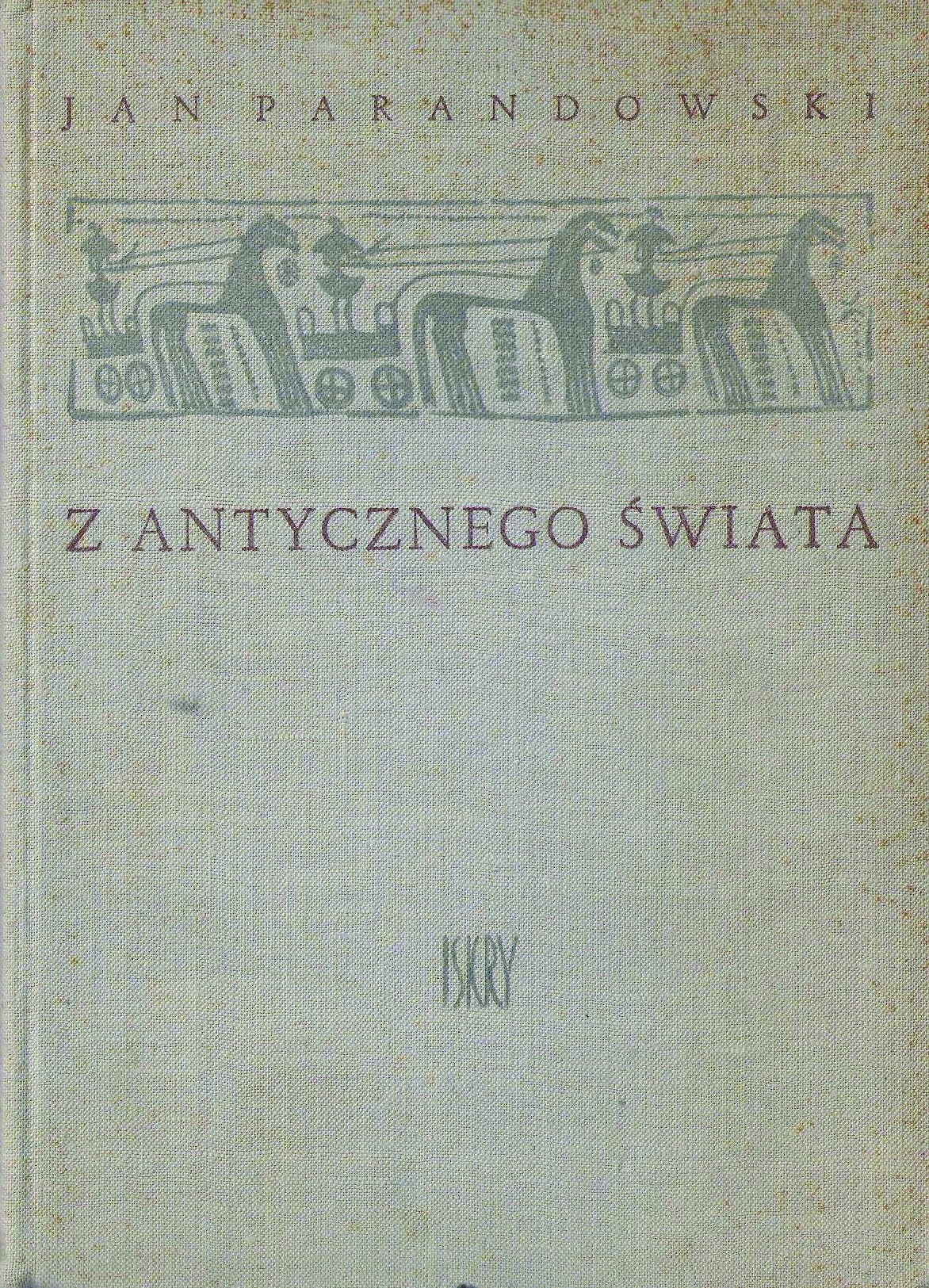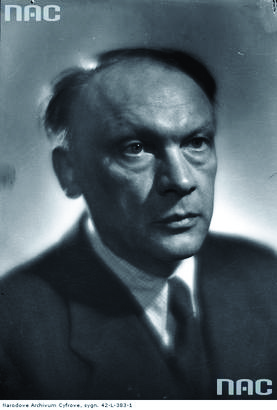Title of the work
Country of the First Edition
Country/countries of popularity
Original Language
First Edition Date
First Edition Details
Jan Parandowski, Z antycznego świata. Warszawa: Iskry, 1958, 132 pp.
ISBN
Genre
Essays
Target Audience
Crossover
Cover

Cover design by Mieczysław Kowalczyk. Courtesy of the publisher, Iskry.
Author of the Entry:
Summary: Joanna Kozioł, University of Warsaw, joasia7777@interia.pl
Analysis: Marta Pszczolińska, University of Warsaw, m.pszczolinska@al.uw.edu.pl
Peer-reviewer of the Entry:
Katarzyna Marciniak, University of Warsaw, kamar@al.uw.edu.pl
Elżbieta Olechowska, University of Warsaw, elzbieta.olechowska@gmail.com

Photograph by Edward Hartwig, retrieved from the National Digital Archives.
Jan Parandowski
, 1895 - 1978
(Author)
Classical philologist and archaeologist. An outstanding and prolific author of books related to Antiquity; translator of classical masterpieces. Contributed to many Polish newspapers and magazines. Chairman of the Polish PEN Club from 1933 to 1978. Recipient of prizes for outstanding literary achievements, such as a bronze medal received at the 1936 Berlin Summer Olympics for his book Dysk olimpijski [Olympic Discus]. Member of the European Society of Culture. In 1962 he was elected Vice-President of the International PEN. An exceptionally successful supporter and advocate of Classical Antiquity in Poland. His Mitologia. Wierzenia i podania Greków i Rzymian [Mythology. Beliefs and Legends of the Greeks and Romans], still often read even in primary school, remains for many generations of Polish readers a fundamental source of the knowledge of ancient myths.
Major works: Eros na Olimpie [Eros on the Olympus], 1924, Mitologia. Wierzenia i podania Greków i Rzymian [Mythology. Beliefs and Legends of the Greeks and Romans], 1924; Wojna trojańska [Trojan War], 1927; Oscar Wilde’s biography Król życia [A King of Life], 1930; Dysk olimpijski [Olympic Discus], 1933; Niebo w płomieniach [Heaven in Flames], 1936; Trzy znaki zodiaku [Three Signs of the Zodiac], 1938; Godzina śródziemnomorska [The Mediterranean Hour], 1949; a study on creative writing Alchemia słowa [Alchemy of the Word], 1951. He also translated into Polish Caesar’s Civil War, 1951, and Homer’s Odyssey, 1953.
Sources:
Krełowska, Danuta, Jan Parandowski: życie i twórczość, Toruń: Wojewódzka Biblioteka Publiczna i Książnica Miejska im. M. Kopernika, 1989.
Paciorkowska, Monika, Jan Parandowski, slideshare.net (accessed: December 30, 2020).
"Parandowski Jan", in Jadwiga Czachowska and Alicja Szałagan, eds., Współcześni polscy pisarze i badacze literatury. Słownik biobibliograficzny, vol. 6: N–P, Warszawa: Wydawnictwa Szkolne i Pedagogiczne, 1999, 254–260.
"Parandowski, Jan", in Encyklopedia PWN, encyklopedia.pwn.pl (accessed: December 30, 2020).
wikipedia.org (accessed: December 30, 2020).
Życiorys Jana Parandowskiego, kul.pl (accessed: December 30, 2020).
Bio prepared by Joanna Grzeszczuk, University of Warsaw, joannagrzeszczuk1@gmail.com
Translation
Croatian: Iz antičkog sveta, trans. Dušan Vladislav Pažđerski, Novi Sad: Orpheus, 2004.
Summary
Based on: Katarzyna Marciniak, Elżbieta Olechowska, Joanna Kłos, Michał Kucharski (eds.), Polish Literature for Children & Young Adults Inspired by Classical Antiquity: A Catalogue, Faculty of “Artes Liberales”, Warsaw: University of Warsaw, 2013, 444 pp.
This is a collection of short, varied essays introducing young readers to the fascinating world of Antiquity. Topics are very diverse, ranging from archaeology, Greek art, culture, architecture, history, and the Roman Empire. Parandowski’s light pen makes every chapter a wonderful journey into the depths of ancient history. In addition, the themes are treated in a colourful and humorous way, encouraging young readers to do their own research.
Analysis
Parandowski’s intention in composing his 14 essays was to create a coherent whole. The first essay, Archaeology, invites the young reader to the world of ancient cultures by presenting vivid imagery of legendary buried treasures. In this chapter, archaeology is shown as a fascinating adventure of discovering old worlds, as exciting as detective work. The following chapters refer to ancient Greece, starting from its origins, through Homeric male figures, Greek art, the Athenian state, including the issues of democracy. Then the author moves to later events when the Greek world was expanded thanks to Alexander the Great’s conquests. The journey through time and space continues into archaic Rome, the Republic and the Empire, including a separate essay about Cicero and his vision of an ideal republic and the remaining chapters about Roman civilization. The book concludes with an essay about Latin starting ab ovo, i.e., from the fibula Praenestina with the oldest known Latin inscription and finishing with regret that Latin has lost its status as the language of diplomacy.
Though some information is of a scholarly nature, for example, philological explanations are still provided in an approachable way and do not seem out of place because they fit the style of Parandowski’s reflections. Moreover, the young reader can learn about Antiquity – history, art, everyday life or ideas – but contrary to a textbook, the author uses an informal style and presents Antiquity from the point of view of people living at that time; readers do not even realise that a process of learning is taking place. For example, the chapter about Athens paints a picture of Athenian streets, houses, activities and shows what life looked like, also discussing women and slaves as part of the society. Similarly, the chapter about Rome as a state and a city also presents people’s daily lives. The chapter about Alexander does not show him a ruthless conqueror but rather as a young man, a dreamer inspired by literature and an admirer of Achilles, but at the same time, a wise politician who facilitates cultural exchanges and shapes a new world and possibilities.
Parandowski writes in simple and elegant language. Though sophisticated terms appear in the text, they fit perfectly and are not difficult to understand. As the author was truly passionate about Antiquity, he shares this passion with the readers encouraging them to like and appreciate Antiquity as much as he does. Parandowski describes ancient achievements that are relevant today and shows them positively, glossing over darker aspects of this civilization. A good example is the issue of acculturation of peoples defeated by Rome. Parandowski says that Romans respected the religion and traditions of conquered nations and never discriminated against their language and compares this attitude to practices of Russian and Prussian partitioners in Poland (p. 80).
It is worth remembering that the book was published in 1958 and, as such, can be a precious source of information about the reality of the 1950s. At the same time, some information, especially regarding research, is now obsolete. For example, the author describes underwater archaeology as a new branch (p. 12); he mentions the decipherment of the linear B script as a discovery that will allow for the reading of tablets and shed more light on the Greek world (p. 15). He describes contemporary Greece as a country of small, poor towns poorly connected by an insufficient railway network (p. 26). He also mentions the lack of an international language (p. 131) and an international currency (p. 79). All this shows how much the contemporary world has changed and how far archaeology or Mycenaean studies have developed since 1958. Some references also show that, at that time, in Poland, the horrors of WW2 were fresh in people’s minds – Parandowski ends the chapter Homeric Man with images of storytelling in Achaean tents or Alcinous’ table seen from the perspective of Auschwitz and Hiroshima (p. 33).
Further Reading
Selected bibliography concerning Jan Parandowski’s work and life see here.
Harjan, George, “Jan Parandowski: A Contemporary Polish Humanist”, Books Abroad 34.3 (1960): 223–226.
Hedberg, Johannes, “Hans Kraus, Jan Parandowski, and James Joyce”, James Joyce Quarterly 33.3 (1996): 441–446 (accessed: November 15, 2021).
Homer, Iliada, trans. Kazimiera Jeżewska, intro. Jerzy Łanowski, Wrocław: Zakład Narodowy im. Ossolińskich, 1986.
Homer, Iliada (wybór), trans. Franciszek Ksawery Dmochowski, Wrocław: Zakład Narodowy im. Ossolińskich, 1985.
"Jan Parandowski", in: Nowa Encyklopedia Powszechna, vol. 4: M–P, Wydawnictwo Naukowe PWN, Warszawa, 1996, 775.
Parandowski, Jan, „Człowiek Homerycki”, Roczniki Filozoficzne / Annales de Philosophie / Annals of Philosophy, Vol. 2/3 (1949—1950): 199-204 (accessed: November 15, 2021).


